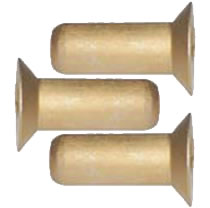
Not all rivets are made of the same material. Some of them are made of titanium. Titanium rivets are very strong and durable, but they typically cost more than rivets made of other materials.
You can also find rives made of aluminum alloy. Aluminum alloy is an advanced material consisting primarily of aluminum that’s mixed with other elements like magnesium, manganese, silicon and zinc. Below are some of the top pros and cons of aluminum alloy rivets.
Pro: Lightweight
Aluminum alloy rivets are lightweight. As previously mentioned, they are made primarily of aluminum. Aluminum weighs less than titanium, steel and many other materials. This makes aluminum alloy rivets a popular choice for aircraft fasteners. They allow for strong, permanent joints while adding minimal weight to aircraft.
Pro: Cost-Effective
While prices vary, aluminum alloy rivets typically cost less than those made of other materials. Aluminum is the most abundant metal in the Earth’s crust. Research shows that it accounts for roughly 8% of the Earth’s crust. Because it’s such as an abundant metal, aluminum is inexpensive. If you’re on a budget, you may want to choose aluminum alloy rivets for this reason.
Pro: Corrosion Resistant
Another advantage of aluminum alloy rivets is their corrosion-resistant properties. They offer a superior level of protection to oxidation and corrosion. Pure aluminum is naturally resistant to corrosion. Aluminum alloy, though, contains other elements that further enhance its corrosion-resistant properties. Even when regularly exposed to moisture or liquids, it will maintain its structural integrity.
Con: Heat Deformation
For fastening applications involving heat, you may want to choose rivets made of a different material. Aluminum alloy will deform when exposed to heat. High temperatures, such as engine exhaust, can deform aluminum and aluminum alloys.
Con: Pre-Softened
Some types of aluminum alloy rivets require pre-softening before installation. They are simply too hard to buck. Therefore, they must be softened with a special solution beforehand. This chemical-based solution will soften the aluminum alloy rivets so that they are easier to buck and, thus, install.
Con: Specialized Tooling Required
Some types of aluminum alloy rivets also require specialized tooling to install. You can’t just install them with a hammer. Instead, you may need a compression gun. The compression gun will compress and deform the rivet so that it stays in place.
Aluminum alloy is a popular material used in the construction of solid rivets. But like all materials, it offers both advantages and disadvantages.



